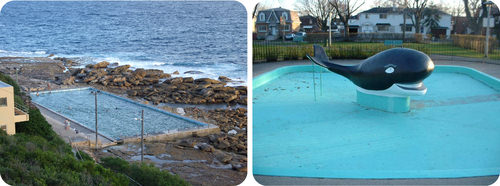17.6 热能和特定热能
章节大纲
-
Which pool will warm up faster?
::哪个游泳池能更快暖和?If a swimming pool and wading pool, both full of water at the same temperature were subjected to the same input of energy , the wading pool would certainly rise in temperature more quickly than the swimming pool. The heat capacity of an object depends both on its mass and its chemical composition. Because of its much larger mass, the swimming pool of water has a larger heat capacity than the bucket of water.
::如果一个游泳池和游泳池,在同一温度下满满水的水都受到同样的能量输入,水池的温度肯定比游泳池的温度上升更快。 物体的热能力取决于其质量和化学成分。 由于其质量大得多,水池的热能力比水桶大得多。Heat Capacity and Specific Heat
::热能和特定热能Different substances respond to heat in different ways. If a metal chair sits in the bright sun on a hot day, it may become quite hot to the touch. An equal mass of water in the same sun will not become nearly as hot. We would say that water has a high heat capacity (the amount of heat required to raise the temperature of an object by 1°C.) Water is very resistant to changes in temperature, while in general are not. The specific heat of a substance is the amount of energy required to raise the temperature of 1 gram of the substance by 1°C. Table lists the specific heats of some common substances. The symbol for specific heat is c p , with the p subscript referring to the fact that specific heats are measured at constant pressure . The units for specific heat can either be joules per gram per degree (J/g°C) or calories per gram per degree (cal/g°C). This text will use J/g°C for specific heat.
::不同物质以不同方式对热作出反应。 如果一个金属椅子在炎热的一天坐在亮太阳下,它可能会变得非常热。同一太阳的等量水量不会变得像热一样热。我们会说,水的热容量很高(将物体温度提高1°C所需的热量)。 水对温度变化非常耐受,而一般情况下则不是。物质的具体热量是将物质温度提高1°C所需的能量量。表格列出了某些常见物质的具体热量。特定热量的符号是 cp, 其下标是特定热量在常压下测量的事实。特定热量的单位可以是每克焦耳(J/g°C)或每克热量(c/g°C)。该文本将使用J/g°C作为特定热量。Specific Heats of Some Common Substances Substance Specific Heat (J/g°C) Water (l) 4.18 Water (s) 2.06 Water (g) 1.87 Ammonia (g) 2.09 Ethanol (l) 2.44 Aluminum (s) 0.897 Carbon, graphite (s) 0.709 Copper (s) 0.385 Gold (s) 0.129 Iron (s) 0.449 Lead (s) 0.129 Mercury (l) 0.140 Silver (s) 0.233 Notice that water has a very high specific heat compared to most other substances. Water is commonly used as a coolant for machinery because it is able to absorb large quantities of heat (see Table ). Coastal climates are much more moderate than inland climates because of the presence of the ocean. Water in lakes or oceans absorbs heat from the air on hot days and releases it back into the air on cool days.
::与大多数其他物质相比,水具有非常高的特定热量; 水通常用作机械的冷却器,因为它能够吸收大量热量(见表); 由于海洋的存在,沿海气候比内陆气候温和得多; 湖泊或海洋的水在热天吸收空气的热量,并在冷天将其释放回空气。This power plant in West Virginia, like many others, is located next to a large lake so that the water from the lake can be used as a coolant. Cool water from the lake is pumped into the plant, while warmer water is pumped out of the plant and back into the lake. Summary
::摘要-
Heat capacity is the amount of heat required to raise the temperature of an object by 1°C.
::热容量是指将物体温度提高1°C所需的热量。 -
Specific heat is the amount of energy required to raise the temperature of 1 gram of
a
substance by 1°C.
::特定热量是将1克物质温度提高1°C所需的能量量。
Review
::回顾-
What is heat capacity?
::什么是热能? -
What is specific heat?
::什么是特定热量? -
You have a 10 gram piece of aluminum and a 10 gram piece of gold sitting in the sun. Which piece of metal will warm by ten degrees first?
::你有一个10克的铝块和一个10克的金块 坐在太阳下,哪个金属块会先加温10度? -
You have a 20 gram piece of aluminum and a 40 gram piece of aluminum sitting in the sun. Which
piece
of aluminum will arm by ten degrees first?
::你有一个20克的铝块和一个40克的铝块 坐在太阳下。
Explore More
::探索更多Use the resource below to answer the questions that follow.
::利用以下资源回答以下问题。-
What was in the first balloon?
::第一个气球里是什么? -
What was in the
second
balloon?
::第二个气球里是什么? -
When the balloon began to melt, it popped. Why did the second balloon melt/pop, but not the first balloon?
Hint: It has something to do with specific heat.
::当气球开始融化时,它就爆炸了。为什么第二个气球融化了,而不是第一个气球?提示:它与特定的热量有关。 -
Would the balloon containing water melt/pop if it was held over the flame for a long period of time? If so, why?
::含有水融化/蒸气的气球,如果在火焰上长时间停留在火焰上,是否会熔化/蒸气? 如果是,为什么?
-
Heat capacity is the amount of heat required to raise the temperature of an object by 1°C.

